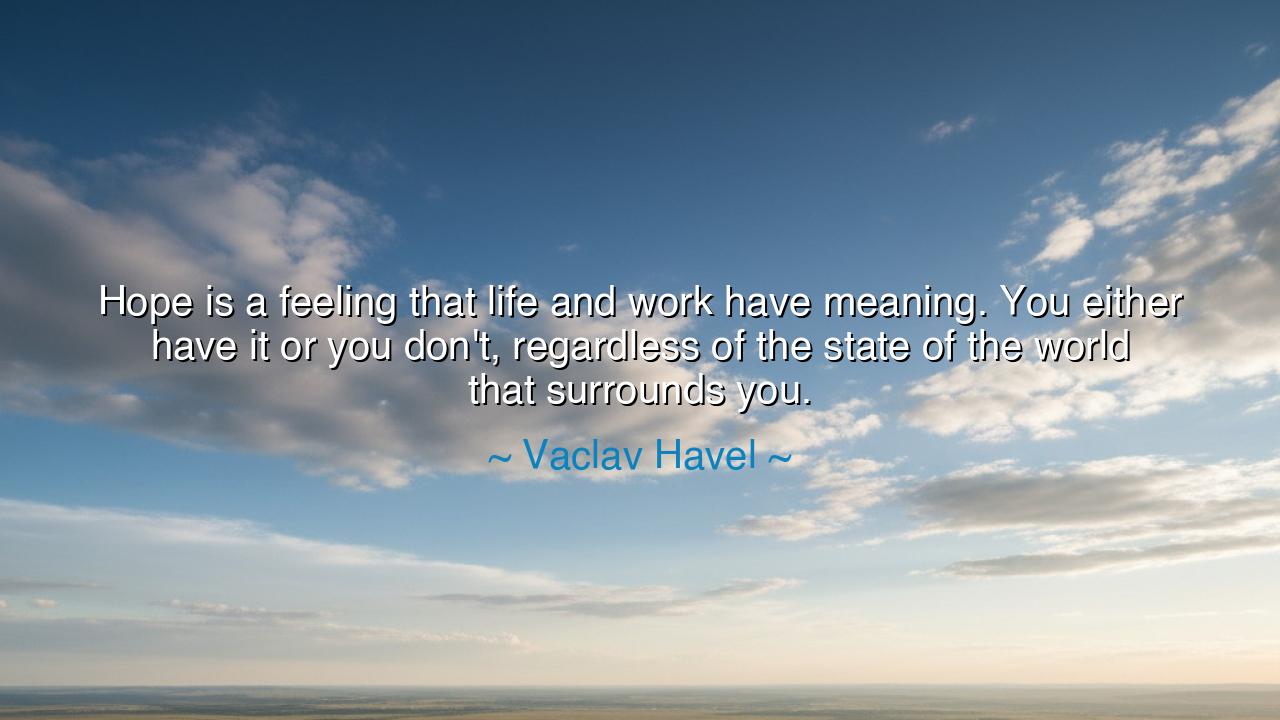
Hope is a feeling that life and work have meaning. You either
Hope is a feeling that life and work have meaning. You either have it or you don't, regardless of the state of the world that surrounds you.






In the councils of endurance, hear Václav Havel teach with a pilgrim’s calm: “Hope is a feeling that life and work have meaning. You either have it or you don’t, regardless of the state of the world that surrounds you.” He is not selling a mood; he is naming an orientation of the soul. For Havel, hope is not a weather report but a compass—set to a north beyond the horizon, steady even when the sky is iron and the barometer falling. In his own words elsewhere, hope is an “orientation of the spirit… a state of mind, not a state of the world.” It does not depend on favorable odds; it rests on the conviction that what we do means something, even when success hides its face.
The meaning of the sentence is double. First, it binds hope to meaning, not to outcomes. A person can labor under grey regimes, in failing markets, amidst family sorrow, and still be rich in hope, because the work itself participates in the true and the good. Second, it warns us that despair often masquerades as realism. If we wait to see improvement before we act, our hands will stay idle; if we anchor purpose to results, a single setback will cut our moorings. Havel’s grammar is stern and freeing: do the thing that matters because it matters; let the state of the world be weather, not law.
As to the origin, Havel pressed this teaching most memorably in Disturbing the Peace (1986), in the chapter “The Politics of Hope.” There he says, “Either we have hope within us, or we don’t… Hope is not prognostication. It is an orientation of the spirit… a state of mind, not a state of the world.” The popular wording you’ve quoted—“Hope is a feeling that life and work have meaning”—circulates widely in anthologies and quotation lists as a paraphrase of that passage, keeping his central claim intact: hope roots in meaning, not in mood or odds.
History gives his words a body. In the long night before the Velvet Revolution, Havel wrote from prison and from surveillance-darkened rooms, insisting that citizens should “live in truth” even when lies seemed to rule. That hope was not cheerfulness; it was fidelity—samizdat printing presses humming, kitchen seminars gathering, candlelit vigils refusing to blink. When the regime finally cracked, it was not because the world had turned sunny, but because thousands had already chosen meaning over fear. Havel’s hope was proved to be a discipline before it became a dawn.
A humbler story makes the lesson plain. A nurse on an underfunded ward rises for another twelve-hour shift. The numbers on the dashboard are terrible; the newspapers are worse. Still, she writes a patient’s name in careful script, warms her hands, and listens without hurry to a frightened son. No camera records it; no graph improves for it. Yet the act is dense with meaning: the work serves the dignity of life. By Havel’s measure, this is hope in action—a lamp carried through fog, not because the carrier foresees the clearing, but because light belongs in dark places.
Notice how Havel’s definition protects us from two errors. Against optimism, which withers when forecasts fail, it says: continue, because the good is worth doing even if success delays. Against cynicism, which mistakes fatigue for wisdom, it says: continue, because refusal to act concedes the field. Thus hope is strenuous. It asks for habits—truth-telling, neighborly work, patient coalition—by which each day is given back to meaning, whatever the headlines decree.
What, then, shall we do? First, tether hope to a daily practice: name one task each morning that would still be worth doing “even if nothing changes”—a call, a kindness, a craft done well. Second, keep a ledger of meaning: at day’s end, write one sentence beginning, “Today mattered because…”. Third, build small fellowships of hope—two or three people who meet regularly to trade stories of faithfulness rather than forecasts. Fourth, speak precisely: when others confuse hope with prediction, answer with Havel’s cadence—state of mind, not state of the world.
Carry his sentence like a pocket prayer: Hope, life, work, meaning—held fast, “regardless of the state of the world.” Let it stiffen your spine when fear parades as fact. Let it soften your voice when anger tempts you to scorn. And when the night is longest, remember the dissident’s quiet arithmetic: one faithful act may not tip a scale today, but it keeps the scale honest—and keeps your soul aligned with what is real. That is the kind of hope no regime, trend, or market can confiscate.






AAdministratorAdministrator
Welcome, honored guests. Please leave a comment, we will respond soon